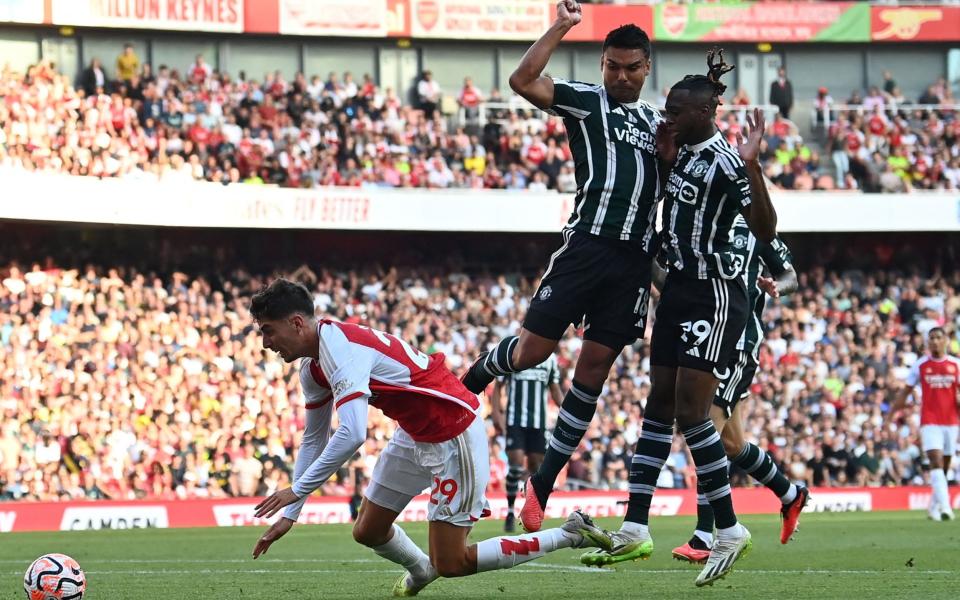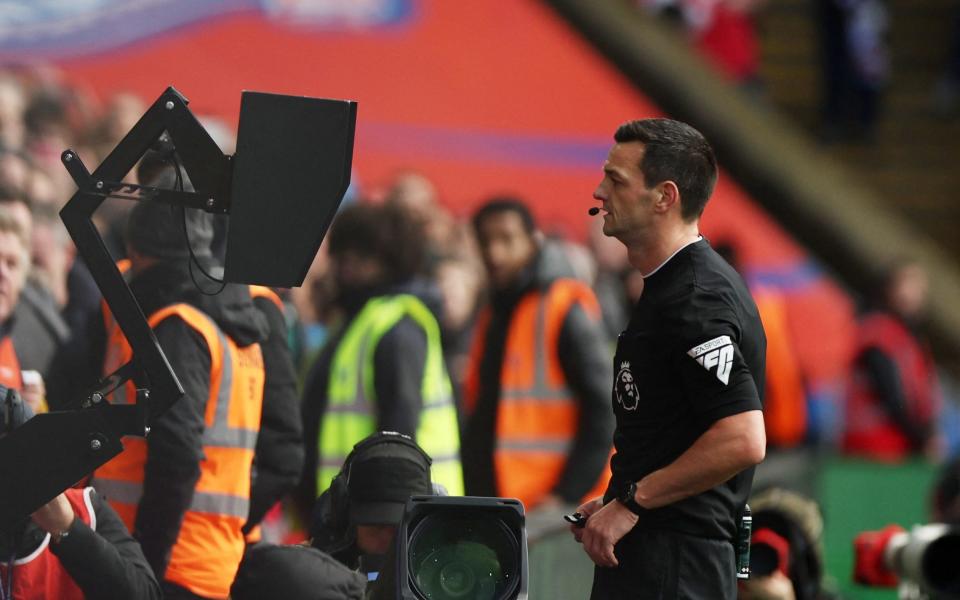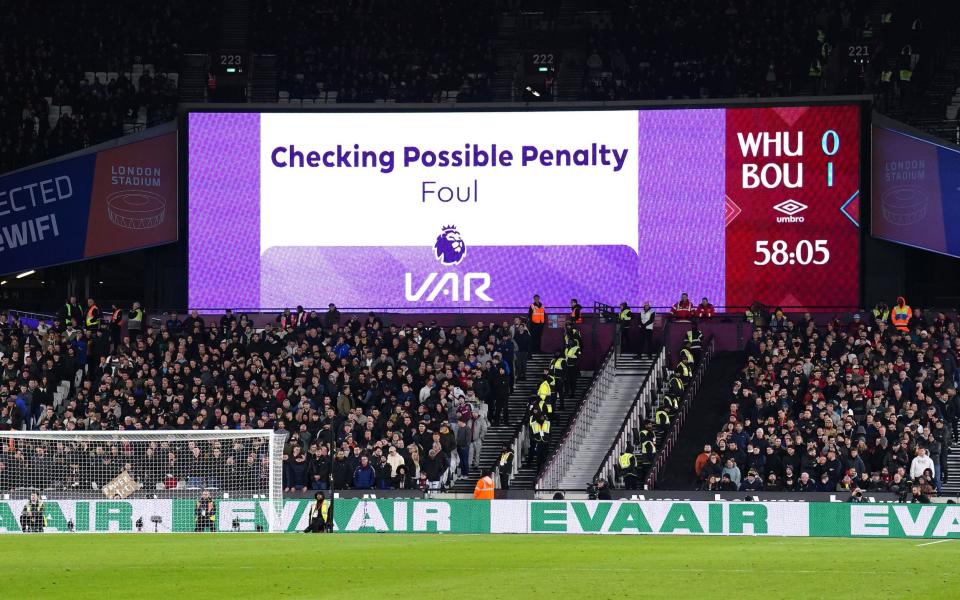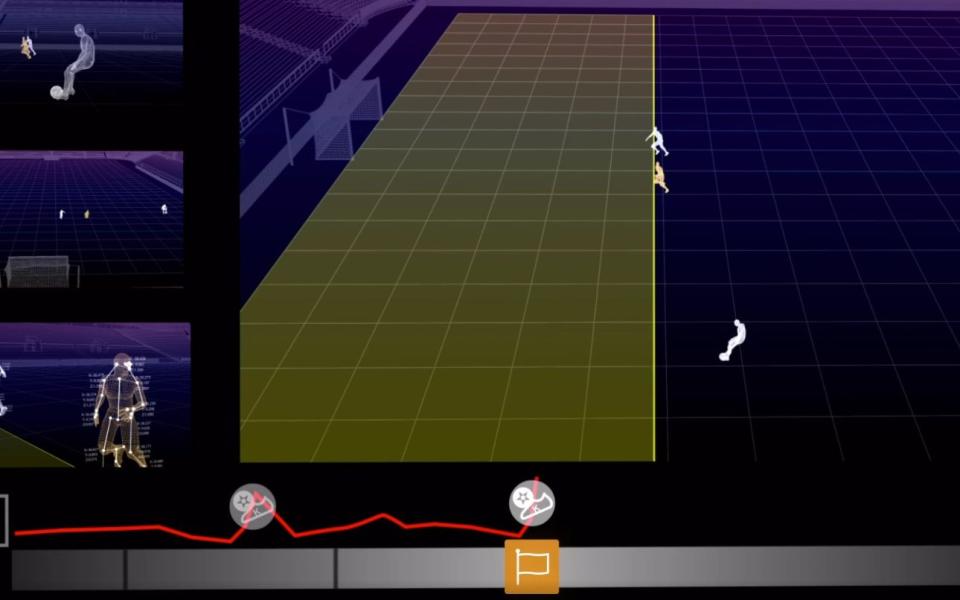The Premier League is calling for VAR reform after admitting that checks are “taking too long” and the supporter experience is “not good enough”.
While frankly admitting that the technology is “poor” for those attending matches, Tony Scholes, the chief football officer of the top flight, admitted that “we have work to do”.
Scholes has fiercely defended refereeing standards but accepted “clearly” that VAR is “not perfect” as he set out plans to speed up checks and improve stadium communication.
One improvement next season will see fans informed of referee decisions during matches, but only until the VAR process for the matter in question is resolved.
But the siege was left frustrated at being “restricted” by the International Football Association Board [Ifab]the legislative body, regarding the introduction of live updates from the VAR.
“It’s not good enough – we know it’s not,” Scholes told supporters as he complained they had been left in the dark this season. “It affects the fans’ enjoyment of the game and we know it has to change.”
As well as lobbying Ifab for better communication, the league’s other main concern is improving decision-making speeds. “The reviews take too long and it’s affecting the flow of the game and we’re very aware of that and the need to improve that speed, and always keep the accuracy,” Scholes said. “Through training development, we want them [the VARs] decide on the facts they see without having to double or triple check.”
Surveys of managers, captains and club directors will be released this month as the league works on improvements in technology and legislation in general.
The handball law will be among the issues, with Scholes revealing how “at our last managers’ meeting, someone asked: ‘We have no idea where we are with the handball law’.” Then other people joined in and supported him.”
Scholes, however, insisted the standard of refereeing is as high as it has ever been and expressed “disappointment” at clubs who have gone public to criticize league officials this season. Arsenal, Nottingham Forest and Wolves have made their feelings known after controversial incidents.
In an extensive briefing detailing the league’s progress on refereeing and VAR ahead of the club’s shareholders meeting in London on Thursday, Scholes also detailed how the majority of supporters surveyed by the league “still favor VAR”, and right decisions increasing from. 82 percent to 96 percent since the technology was introduced.
Overall, VAR errors have fallen from 25 at this stage last season to 20. Subjectively, VAR intervened incorrectly twice – the disallowed Burnley goal against Nottingham Forest and Arsenal’s canceled penalty against Manchester United.


The only “real” mistake this season was the “significant human error” which saw Luis Diaz’s goal unfairly ruled out for offside against Tottenham.
But the length of games and playing time have increased by three minutes and 31 seconds, with “officials making more time wasting”. Yellow cards for offense have risen from 67 at the same point last year to 145.
Extra time has resulted in 92 goals in extra time this season, 49 more than the same period last year. In total, there were 730 goals, which equates to 3.2 per game.
The league will also ask other competitions to stop putting pressure on the fixture calendar. “The calendar is getting more difficult because of the increase in other competitions,” says Scholes.
These are the five things the Premier League wants VAR to improve
Refereeing in the Premier League is more accurate than ever, but the competition now readily admits that VAR still has major issues to resolve. With the top flight hearing from captains, managers and club owners on a variety of topics over the coming weeks, here are the top five items on the agenda:
Too many checks and taking too long
The most common bugfix cited by players, managers and fans alike was the disruption to the flow of the game since the introduction of VAR.
The peak has been in turmoil again this season, with one of the longest checks of the season for Liverpool’s 2-1 win over Crystal Palace in December. During one pitchside review, referee Andy Madley looked at 24 replays before deciding the period was off before awarding a first-half penalty to the home side. Now in its fourth year of use in England’s top flight, the Premier League admits it is one of two problem areas that lawmakers still need to resolve.


Tony Scholes, the top flight’s chief football officer, has not been short of calling for time limits on checks, suggesting instead that recruitment and training are the solution.
“The starting point is that we don’t want to compromise accuracy,” he says. “We have to make sure of that.” However, he admits that “decision times have increased this season” and “that’s alongside the increased scrutiny of the VARs alongside the outcome of a few high-profile decisions this year”.
One of those incidents that will undermine confidence in quick decision-making is the mistake that denied Luis Diaz a goal for Liverpool against Tottenham last September.
Additional scrutiny adds pressure “but through training development we want them to focus on making a decision on the facts they see but not having to double or triple check,” said Scholes.
Audio VAR
Scholes admits that the experience of VAR when you are present at a game is extremely “poor”. His solution is to lobby Ifab lawmakers to liberalize their rules on allowing competitions to provide live updates of decision-making. Eventually, he believes a decision-making video at Stockley Park could be put on big screens in the grounds.
“They’re very clear at the moment that we can’t use the sound and we can’t play the sound,” explained Scholes. “My personal opinion is that we are on a journey, and that will come and we will reach a point where both the video and the audio are played live and then afterwards to explain the decision… But we will continue to lobby to reach a place where VAR is as open, transparent and informative to supporters and all stakeholders as possible. One development we are hoping for, of course, is for the referee to announce their decision after a VAR review to the crowd on the side of the pitch.”


Doubts about the semi-automatic offside technology
After being more cautious than other competitions about introducing VAR in the first place, the Premier League is still unsure about automatic redundancies. The Premier League has a contract with Nike so would not be able to use an Adidas ball chip similar to the one being used at Euro 2024. For the first time, Scholes said he could not guarantee that the clubs would be able to vote. on the introduction of technology in time for next season. Describing it as a “note of caution” to those who called for its introduction, he said: “First of all, we do not believe that this will increase the accuracy of decision-making.” The league is still testing “a few systems,” he explained, adding that “it’s not certain” any firm decisions will be made this year. “We want to be absolutely sure that it will improve the situation and not detract from it in any way,” he said.


Calendar matching
The “hot topic” the league will be promoting in the coming months is that the fixture calendar will be full, with players facing an 80-plus game season with an expanded Champions League, a bigger World Cup and additional competitions in between. “The feedback from players and coaches has been very clear… we are very supportive of the position being taken by the PFA and the LMA in terms of the interests of the players to ensure that all competitions and all authorities on the information about the impact of the calendar on his player,” he says.
Keeping complaints from managers and clubs in house
In a season where the likes of Arsenal and Nottingham Forest have pressured referees with complaints from the public, the league is trying to stop a growing trend.
Scholes says it can be “a bit disappointing when clubs go public” since “we are in contact with clubs all the time in terms of resolving decision-making decisions”.
This year the league has established “an improvement advisory group with half a dozen club representatives on that group” to address any concerns. There will also be a “major survey this month of football managers, captains, directors of football and executives” on topics including VAR and handball thresholds.